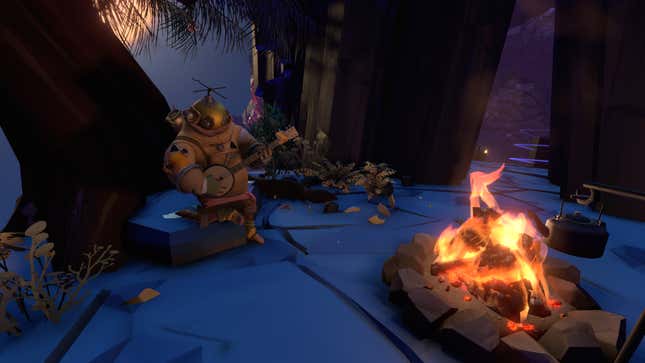
In Outer Wilds, you have 22 minutes to launch into space before your sun goes supernova. The objective isn’t to avoid this fate—no one knows it’s coming. Instead, you, a four-eyed alien from the peaceful planet of Timber Hearth, are merely doing what your culture prizes above all else: exploring. After those 22 minutes are up, everything ends and you start all over, somehow retaining the memory of your past life. You don’t know why, but maybe you can find out. There’s a lot to discover, but you only have so much time.
Players sometimes find time limits in games stressful. I’ve spoken to people who’ve avoided The Legend of Zelda: Majora’s Mask—one of the very best games in that series—simply because they didn’t like the idea of being stuck in a time loop. But Majora’s Mask effectively uses its timer as a tragic narrative device. Dead Rising 2 used a timer to make the central zombie-killing loop much more fun by adding tension that its easy-to-kill zombies intentionally lacked.
In Outer Wilds, the timer is beautiful. It makes me think of fragility.
The solar system Outer Wilds is compressed. It takes moments to get from your home planet of Timber Hearth to its moon. Once you get a hang of controlling your vessel, you can get to any other planet in the system in just a couple of minutes. While your character’s life doesn’t start at the beginning of the loop, one cycle of the loop, and what you do during it, can be read as a metaphor for a life.
A single exploration attempt by your character is brief, but its impact can be massive. You can learn something that fundamentally shifts your culture’s understanding of the ancient Nomai civilization that seems to be at the heart of the time loop mystery. You can learn the dangers and hidden wonders of a far-off planet. All of what you do is recorded in your ship’s log, a record that remains through every time loop. A testament to the things you tried to do and what you learned.
Or maybe you won’t learn anything. Maybe, like I did my first time out, you’ll accidentally fly into the sun. Then the loop begins anew, and you don’t feel like you’ve accomplished much of anything, except maybe learning how easy it is to fly into the damn sun. That’s not nothing, though.
Seen through this lens, Outer Wilds becomes a game about using time well. Twenty-two minutes isn’t a lot of time—you’ll find yourself deep in the heart of planet with answers to questions seemingly within reach, and then it’s over. You wake up by a campfire, and you start again.
Outer Wilds may have a set time loop, but in one of its best design decisions, it doesn’t tell you about it, nor does it ever display how much time is left. It’s an inversion of how we usually think of time: limited in a way that we can’t fully grasp, always running out, spent well or wasted. You could set a timer if you wanted to, but it would rob you of something beautiful—the feeling that in this moment, you are writing a story. It may or may not be remembered, but it is yours.
The end is coming, but in this moment, it has not. In this moment, there is so much time.